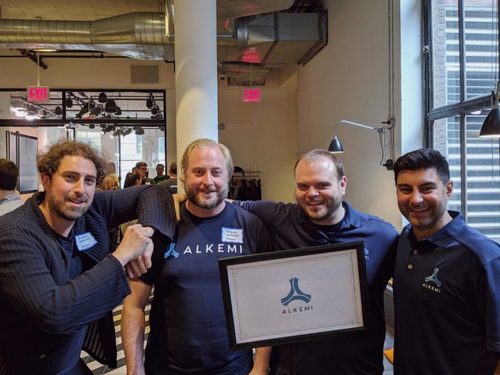Today at the demo day for Techstars’ blockchain cohort, Alkemi CEO Ryan Breen will unveil a crypto liquidity pool deal worth $16 million from industry veterans like Joseph Weinberg, chairman of the data network Shyft, and Alex Friedberg of BXB Capital.
Alkemi is looking to create a liquidity system for exchanges by making an accessible honeypot that service providers can dip into when demand increases faster than supply.
The Alkemi protocol will let users connect their personal wallets to a smart contract via a mobile app that, like a savings account at a bank, allows exchanges to use those funds for settlements while users determine their own lockup timeframes. This isn’t a loan, however, it’s a type of virtual deposit where the user retains custody of the private keys.
“We’re starting with ethereum because that’s where the lion’s share of a lot of the token issuance has been”, Breen said.
A new type of decentralized finance (DeFi) app wants to boost crypto-market liquidity by offering you interest on your coins.
“It’s solving inter-settlement lag”, Weinberg told CoinDesk, comparing Alkemi’s model to bitcoin-oriented solutions like Liquid. “You have a reduction in fee rate across the space over time because you have general liquidity across the space. You have a faster rate of execution.”
While the app, scheduled for launch by 2020 after the protocol undergoes security audits, will eventually support bitcoin, fiat-backed stablecoins, XRP and a variety of other assets, it fits squarely into what Breen called the DeFi movement, which includes the use of smart contracts to experiment with utility and efficiency for self-custodied assets.

Stepping back, the most prominent DeFi projects so far include the loans startup Dharma, the token exchange platform UniSwap and MakerDAO, which is often associated with the ethereum-backed DAI stablecoin. Although DAI has failed to maintain its dollar-peg over the past few months and loan fees continue to rise, DeFipulse.com shows more than $332 million worth of cryptocurrency is currently locked in Maker and Dharma loans alone.
Breen said liquidity across the space remains a hurdle.
“Decentralization by design is dividing and separating the concentrations of wealth. But then you have liquidity issues where it actually requires concentrated access to wealth”, Breen said. “We believe that solving the liquidity paradox in the space will involve projects working together, as opposed to one, winner-take-all scenario.”
Communal Access
In order for this to impact the DeFi ecosystem, exchanges and other distribution platforms will need to get on board.
Alkemi is betting that providing liquidity pools will save exchanges and institutional funds money. Those savings are then divided into three parts: app users gain a third of the crypto saved (like interest on a savings account), Alkemi gets a third and the institutional partner keeps the remaining loot.
“The biggest problems arise with surging demand where liquidity dries up”, Frank Schuil, CEO of the Swedish exchange Safello said in reference to the broader market. “Established players have little problems tapping into these liquidity pools. More difficult is to get good terms from these parties and agree on settlement arrangements.”
While Safello isn’t a member of the Alkemi consortium, Weinberg said this is precisely the type of friction he hopes the new DeFi startup can address.
Speaking to how integrating with exchanges could reduce price inefficiencies while increasing access among less well-established players like the DeFi protocol Uniswap, Weinberg told CoinDesk:
“A lot of the times you have exchanges that have to re-balance their own books, and not just exchanges, all kids of liquidity pools. … The question is can you have smart contracts controlled by participants that make the flow of capital more efficient?”


